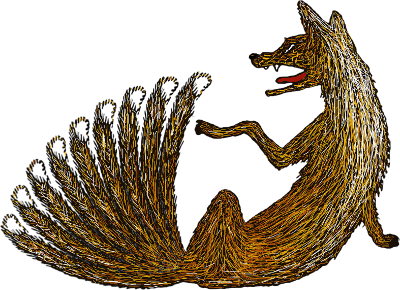Magic does not exist.
There is no proof, of course,
but there is no proof of magic's existence either. As more and more of
the science of the universe was discovered, fewer and fewer people
believed that magic could possibly exist until any who did were
considered insane and delusional. Powerful magicians, mythical
creatures, unexplained phenomena of the world; all of the works of magic
were naught but myth and legend, not forgotten but no longer believed
in by the general populace.
Until one day.
It
was a city, no different than any of the others that dominated the
earth. Most signs of nature were eradicated from the planet, with only
nature enthusiasts and specified areas such as parks remaining as signs
that the world was once full of greenery. The city had one such park,
but it was lackluster, maintained by those who cared little for its
contents.
The routine of the caretakers was a simple
one, and it rarely changed. Water and trim the wilting plants, make sure
that none of them had been damaged by unnatural causes, and otherwise
perform general maintenance. It was an easy job, with few surprises.
Then the tree appeared.
There
was no warning to its arrival. Nothing existed in the spot but browning
grass one day, and the next day there was an immature sapling in its
place. On the first glance, the park caretaker barely took note of the
new addition.
Then the sapling grew again, going from
an immature sapling to a nearly full-grown tree. The caretakers were
suspicious - how did such a tree get there? But they had no answers, and
simply reported its presence. The report got no immediate response.
The
next day, the tree was on par with the others in the park, other trees
that had been growing for decades to reach their full potential.
Each
day, it grew and grew, and within a single week it towered over
everything in its vicinity, branches reaching out to cast shade over the
entire park. Scientists came in to study the tree, but had found
nothing in those few days. It quickly became a tourist attraction, and
one historian named it the "Iei Tree".
Despite the
unsettling nature of its appearance, those in charge of the city
relaxed. It wasn't significantly damaging the other parts of the park,
and it was bringing tourism to help the city. All was well.
That was when the Iei Tree began to truly work its effects upon the world.
The
park caretakers woke to find that the animals living in the park had an
unsettling intelligence, watching them do their work. Citizens of the
city began to notice that their electronics were failing at random
intervals, or giving false readings.
And the entire
city noticed when the first dragon appeared, bellowing rage and flames
down at the weak creatures that dared to exist near it.
It
was chaos. One dragon was followed by another, and another. It seemed
an entire family of dragons had come forth, and the city
burned. Everyone fled, leaving behind anything they couldn't live without as draconic fire ravaged the city behind them.
Only
days later, after the city and thousands of people were long lost, did
anyone make the connection that the Iei Tree might have been a cause of
the event instead of just another symptom. By then, the former city was
ruled by dragons, chimeras, and all manner of creatures long thought to
be mere works of imagination.
Even as the military
planned to make their way back into the dragons' nest, the Iei Tree
continued to grow. It grew higher than the buildings, higher than the
skyscrapers, higher than everything until it towered above all else.
Nearly the entire
continent could see the edges of the Iei Tree's
canopy. And with the shadow of the Iei Tree came the creatures of myth
and legend. Not just the more exotic creatures that legendary adventures
centered about, such as chimeras and dragons, but also animals with
intelligence, the gift of speech, and even magic of their own.
The
world eventually organized their group of soldiers and scientists,
picking only the best and most resilient to go on what might very well
be a suicide mission. But the grim prospects seemed to be simply
paranoid, as the group managed to sneak through the mythical land
overcast by the Iei Tree, picking their way across the ravaged ruins of
the city until they finally reached the trunk of the tree itself.
It
was a massive structure, the Iei Tree having long since consumed the
park in which its life had begun. All of the group found themselves
staring in awe before they snapped themselves from their daze and began
their work.
Had the situation been less dire, they
might have tried to make sure that the Iei Tree was the cause of the
myths coming to life before attempts to kill the tree were made. But too
many had died, and would die, for them to risk taking that time.
Unfortunately, nothing seemed to work.
Attempts
to chop down the tree resulted in the wood regenerating before their
very eyes. Poison simply vanished with no effect, as if it had never
existed. The Iei Tree seemed impervious to flames as well, with no part
of the massive tree even burning for a single instant.
The
group was ready to give it up as a lost cause. Days had been spent
trying to take down the Iei Tree, but it proved to be an unkillable foe.
"You're in quite a hopeless situation, aren't you?"
Guns swiveled to aim at the voice, only to find a small grey bird. It ruffled its feathers before speaking once more.
"Do you truly wish to do that? I mean you no harm, but the same cannot be said for any others who will hear you kill me."
Grudgingly,
the guns lowered. While it was nothing like the human expression, the
bird gave what could only be called a smug glance at the humans before
continuing.
"Very good. Now, I am Kha Phreit. As much
as it may surprise you, I am just as disgusted by the rampant deaths of
your kind as you are. And so I will share with you a secret, a secret
that might help you kill this monstrous tree.
"There
lives a tiger in the branches of the monstrous tree. His name is U Khla,
and he is the one who makes your progress meaningless. When you cut the
tree, he heals it with his magic. When you poison the tree, he purifies
it before more than a single patch of wood might be harmed. When you
burn the tree, he protects it such that not even a leaf will be consumed
by the flame. If you wish the tree's death, U Khla is the one you must
take down first."
Message given, Kha Phreit flies off.
Behind
him, the soldiers and scientists stare at each other. Believing in a
creature brought into the world by the Iei Tree is difficult, but to do
so would give them hope. It would give them a way to snatch victory from
the jaws of defeat, and save the world for humanity.
They
climb the tree, wary and ready for an attack. The further they climb,
the darker it becomes, until the leaves of the Iei Tree block all light
except their own.
From the darkness, echoing from all directions, a voice growls at them.
"So, that foolish bird has told you of me. You would kill me so that you may kill the tree, hmm?"
Guns snapped up, pointing in every direction, but the soldiers dared not fire blindly.
"Have
you thought nothing of what the tree's death would do to us? All of our
lives, all of our existences, are bound to this tree. With its death
comes ours as well."
One soldier, temper frayed, replied. "Like your kind haven't killed humans! However many of you we kill, it's
nothing compared to the number of us who have died!"
The
voice scoffed. "Do not assume all of us to be so crude and cruel as the
dragons. And do not assume that their reasoning does not exist. Do you
not realize where we are from, where we have been summoned from?
Creatures of myth - oh yes, we know of our status in your world - do not
simply appear from nowhere.
"We were summoned forth
from those exact myths and legends, from that long-forgotten past, where
many of us - especially the dragons - were hated by humans, hunted by
humans. When the dragons saw humans thriving, powerful and plentiful in a
way they had never known, of course they would attack. They know of the
dangers of humanity, and are terrified of letting your kind have the
opportunity to kill them."
A hush fell over the group
of soldiers. "Then what do you want? We can't just leave things be," the
same soldier spoke. There was only silence from U Khla, for such a long
time that the soldiers began to believe he had vanished. Then, he
replied at last.
"I... do not know. But I- we, are
willing to strike a deal. Not only myself, but all of our kind who do
not agree with the dragons. Should humanity cease its attempts to kill
the tree, should you agree to allow its existence to continue, then we
shall aid you in fighting against any threat from those who the tree has
brought forth."
They almost didn't agree. None of the
soldiers had the authority, and many were still angry over how many had
died due to the Iei Tree.
But despite their anger, despite the possibility of failure-
"We accept."
----------------------------------------
Author's
Note: The original tale, The Legend of the Iei Tree, is of a famously
large tree on top of a mountain. The shadow of the tree is so dense that
the sun can't get through at all, and the earth below it is barren. The
tree keeps growing until people are driven out of its shadow, and it
begins to threaten the entire world. A group of woodcutters gather and
go to cut it down, but every night the damage they do is repaired. A
Khasi wren, Kha Phreit, goes to the woodcutters, who laugh at the idea
of the bird helping them. After chastising them, Kha Phreit tells the
woodcutters that a large tiger, U Khla, has been licking the tree every
night to heal the cuts on it. The woodcutters stick their axes into the
tree, blades out, and U Khla cuts his tongue on the axes that night.
Fleeing, U Khla never returns to the Iei Tree, and the woodcutters are
able to cut the tree down.
When I was considering how
to retell this story, I began by thinking of transitioning it into a
modern setting. A massive tree growing in the center of a city, in an
extremely modernized world, seemed like an interesting change to the
story. Given the modernization, making the land barren wasn't as big of
an issue, so I changed the Iei Tree's threat to bringing forth mythical
creatures, which also allowed me to keep the characters of Kha Phreit
and U Khla. Lastly, I changed the ending, since I like the idea of magic
(the mythical creatures and the Iei tree) and science (the very
modernized world with previously little nature) managing to find a way
to coexist, even if it's only a tentative idea by the end of the story.
Bibliography: The Legend of the Iei Tree from Folk-Tales of the Khasis by Mrs. K. U. Rafy.
Web Source
Image: "Giant Tree, St. Andrews University". Copyright Anthony O'Neil.
Web Source










